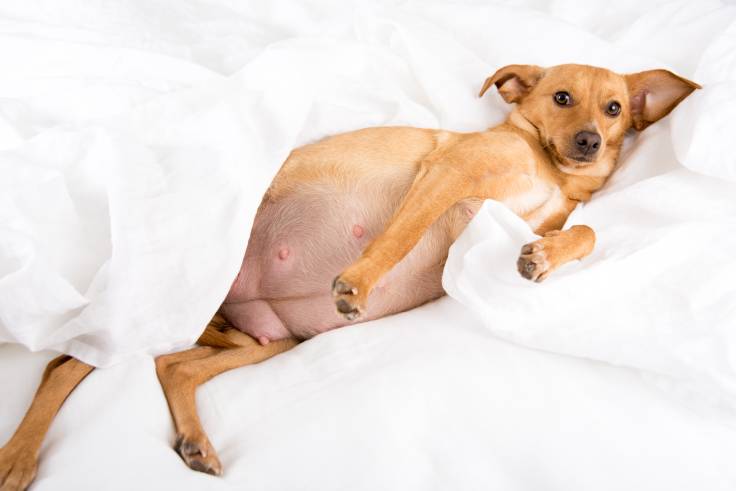Connect with a verified veterinarian in minutes. Licensed vets are available 24/7 to answer your questions. No need to worry about your furry family member.
Puppy absorption is a topic that’s not well understood; however, it usually happens before a mother dog has been confirmed as pregnant. The breeder or the pet parent may not even be aware their canine fur baby was even pregnant.
Even so, there’s a medical term for this process, which is properly called canine fetal resorption.
What is Canine Fetal Resorption?
This condition also referred to as puppy absorption happens when a mother dog reabsorbs one or more puppies in a pregnancy. Fetal resorption only occurs in dogs during the early weeks of pregnancy, when the tissues are soft, and the bones are not hardened.
Canine fetal resorption happens in at least 11% of all canine pregnancies. While that’s a scary thought, absorbing unformed puppies can be a life-saver for the mother and other puppies in the litter. When this happens, only one or two puppies may be reabsorbed into the mother’s body. However, it can happen that an entire litter is reabsorbed.
If only one or two puppies are reabsorbed, the chances are high that the mother and other puppies in the litter will be healthy, and the pregnancy will continue normally.
What Causes Canine Fetal Resorption?
Canine fetal resorption can be caused by too many reasons to list here. However, there are some common issues that may cause issues with the pregnancy. We’ve divided the causes up between non-infectious and infectious causes. We’ll start with the non-infectious causes first.

Review symptoms, medications & behavior to keep your pets healthy with a Vet Online in just minutes.
Ask a Vet Live NowNon-Infectious Causes of Puppy Absorption
- Genetics
- Drugs
- Nutritional
- Developments/chromosomal defects
- Hypothyroidism
- Placental or uterine anomalies
- Hormones
- Environmental stressors
Infectious Causes of Puppy Absorption
- Brucella canis
- coli
- Canine herpesvirus
- Parasites
- Streptococci
- Staphylococci
- Pasturella
- Proteus
- And more
When It’s Not Puppy Reabsorption
There are other times when a breeder or pet parent may believe their dog has reabsorbed her puppies. However, there are times when this is not the case. For instance, false pregnancies are sometimes thought to be puppy reabsorptions. In this case, the mother dog appears to have pregnancy symptoms, including milk production and weight gain. However, no fetuses are present. At some point, the dog stops having symptoms and goes back to her normal non-pregnancy state.
Pet parents, especially, may believe their dog was really pregnant and has reabsorbed the puppies. However, that’s not always the case.
Another instance can be an early ultrasound that shows a fetus when there isn’t one. When the mother dog eventually gives birth, pet parents may be surprised to find fewer puppies than they expected and may assume the mother dog has reabsorbed a puppy.
False pregnancies are a common problem and are almost impossible to tell from real pregnancy.
Canine fetal resorption is a common issue usually not noticed by breeders or pet parents. And many causes of this issue are not preventable, and there’s not much you can do. However, if your dog seems to have this problem regularly or experiences other problems with the breeding process, it’s time to call the vet for a checkup. The vet will check your canine companion for any underlying health issues.
Connect with a verified veterinarian in minutes. Licensed vets are available 24/7 to answer your questions. No need to worry about your furry family member.

Julie
Julie is a graduate of the University of North Carolina, Wilmington, where she studied Animal science. Though contrary to the opinion of her parents she was meant to study pharmacy, but she was in love with animals especially cats. Julie currently works in an animal research institute (NGO) in California and loves spending quality time with her little cat. She has the passion for making research about animals, how they survive, their way of life among others and publishes it. Julie is also happily married with two kids.
Review symptoms, medications & behavior to keep your pets healthy with a Vet Online in just minutes.
Ask a Vet Live Now

